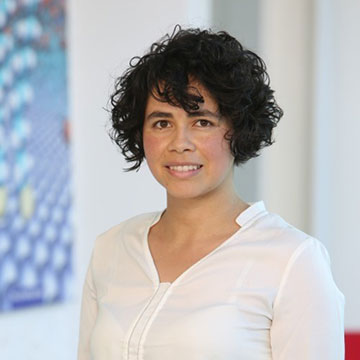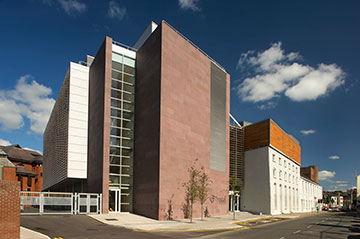
Courtesy of Andrea Pacheco
OPN has been talking with members of the optics and photonics community in a variety of areas to get their perspective on how the COVID-19 crisis has affected their lives and work, and what the pandemic means for photonics. On 14 April, we spoke with Andrea Pacheco, a Colombian Ph.D. student completing her biophotonics studies at Tyndall National Institute, Ireland.
How did you come to be at Tyndall, and what are you studying?
I am from Colombia, and after finishing my master's there, I wanted to find a position that would give me a bit of both worlds: industry and academic research. Tyndall is a great place for this because it’s a center that is very deeply linked to the University College Cork, but it’s also independent—the institute has its own projects with academia, as well as with industry and with other partners. My Ph.D. is in biophotonics, and I’m in my last year.
My project explores a technique called GASMAS—gas in scattering media absorption spectroscopy. This technology is a promising solution for sensing the presence of oxygen and measuring its concentration in the lungs of preterm babies with neonatal respiratory distress syndrome (RDS). You can use this technology, which depends on near-infrared light, to continuously monitor the lungs of babies with RDS and avoid the use of X-ray radiation, which can be harmful for the babies.
The project has been going very well. Probably at the end of this year, if everything works as we expect, we will start the first clinical trial here in Cork.
Will the coronavirus affect that timeline? It seems that, being in your last year, this would be a particularly bad time to have your research halted by a pandemic.
Yes, it is; and I've been thinking a lot about what's going to happen. Usually, as researchers, we tend to have everything planned. And even though plans never go exactly as you expect, this is a gigantic turn of events that we didn't expect at all.
Fortunately, I have a lot of data analysis to do and also a lot of things to write. So I can use this time working from home to finish paperwork and do computer-based work. But I don't know what is going to happen with the machine that we want to bring here for the clinical trial. It’s supposed to be coming from Lund, Sweden, and I don't know if it will be possible—right now, all flights are canceled coming to Ireland. I also don’t know what rules or precautions governments are going to establish once we slowly come back to normal life.
I’m also thinking about what will happen after I get my Ph.D. Before, I was looking at other European countries for my postdoc, and I was considering applying to positions in industry. Now, I don't know. If there are new policies from the European Union, then how will they affect immigrants like me? On top of that, there will definitely be a lot of people losing their jobs. Will there be more positions?
Being in biomedical optics, perhaps you have an advantage in your job search.
![]()
Definitely. I think I was already in a very good position before the pandemic because photonics technology is evolving so fast. And the next step is photonic integrated systems—how you can make systems better, more accurate and faster with light; there’s no other way to do it. So it was a really good moment to be in the field, even before. Now, with these challenges that we're facing, I think people in photonics are going to be very busy.
I also hope that this crisis will open new paths and new positions that we couldn’t imagine before. We’ve proven that we can work from home effectively, so perhaps there will be more possibilities to collaborate and do research together from different parts of the world.
This is something that is already happening with coronavirus—there are so many researchers linked together by the common goal of solving the pandemic. I think this is a nice model of what we can do as researchers on a global scale.
What is the situation in Ireland right now? How is the government responding?
The government has been very quick in its response. I remember we had the first confirmed case up in Dublin on a Friday or on a Thursday, and then the very next week, by Wednesday, everyone was getting ready to work from home.
Ireland was positioned well to handle this, I think, because Ireland has been in an economic boom. So the government was able to effectively guarantee that everyone can stay safely at home—if you lose your job or can’t afford food, the government will cover expenses. They also opened up all private and public hospitals, so there is no distinction between private and public health care with regard to coronavirus patients. Everyone will be treated for free.
The Irish health service has a very nice web page for keeping people informed and updated on what to do. There aren’t people queuing in the hospital asking for tests or things like that. There are separate testing facilities that are purposefully set up far away from hospitals. So, I think that Ireland is actually responding very well; the death rate from coronavirus is quite low, and the health system is not crashing.
What sort of prevention measures are people taking?

Tyndall National Institute
The Irish mentality, even before the pandemic, is about prevention. One of the things that was shocking for me when I first started at Tyndall was the amount of health and safety training I had to do—it's just part of Irish culture to prevent big problems.
So the country is taking distancing measures seriously. Right now we all are supposed to stay at home, but we are allowed to go outside to exercise as long as we stay within a two kilometer radius of our homes. There are guards that circle the city and make sure that we are exercising either alone or just with our housemates. Otherwise, we all maintain two meters social distancing.
You're originally from Colombia. What are you hearing about the situation there?
The way Colombia will deal with this pandemic is not as promising as it is unfolding here in Ireland. A big part of the Colombian population depends on a daily income to eat, and the health system in Colombia is not great. The President called for lockdown, but people are struggling because they have to decide to either stay home and have no food, or go out. The government has tried to deliver food to those that cannot afford the lockdown. But there is a lot of corruption, as usual, and there are some politicians that are taking advantage of the situation.
Also, the medical staff are not well equipped to deal with these patients and protect themselves from getting infected. Hospitals are closing, there is no budget and there are high-population regions, with hundreds of thousands of people, where you won’t find respiration devices.
I'm lucky because none of my friends or my family are in danger, and my family is fortunate to be in lockdown in their home in the countryside. Still, this is one of my constant concerns; it will be very challenging in my country.
What are some of the things you've been doing to keep progress moving forward, professionally? How is Tyndall supporting this?
Tyndall is very international. They know that most of us are alone and far from home, so they immediately planned to help protect our mental health—HR is always supporting us.
The message from Tyndall is that it’s okay to not be as productive as we usually are. But they also try to make sure that we can do as much as we are able to. So in my team, for example, we keep our weekly meetings every Tuesday with the whole team for two hours. And I also have my project meetings every Friday.
The main problem is the lab-based activities that we can’t do from home. So we’re trying to work around it for now and to plan how are we going to do these activities once we are back.
As someone who is thinking about starting her career, what are your thoughts about the future?
I think that the world as we knew it is not coming back. And I am very excited, really, about the new job opportunities that will come out of this. But COVID-19 has also caused a lot of introspection: Why are we in this situation? How can we avoid something similar in the future?
Although the situation is harsh and strange, it has also showed us how easily we can adapt to something—it’s impressive. I hope we will not have a short-term memory, and we can learn from this and move forward in a very safe way, and always think about how our individual choices and actions may affect others. I think the virus is making us a bit more human and making us think more globally.
